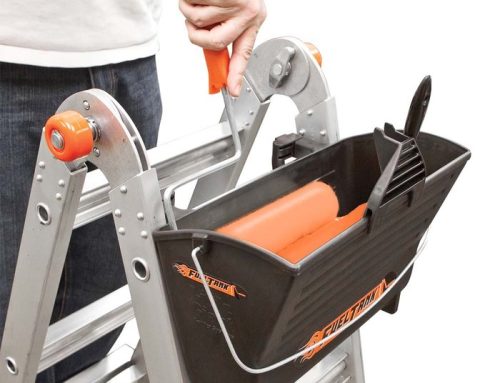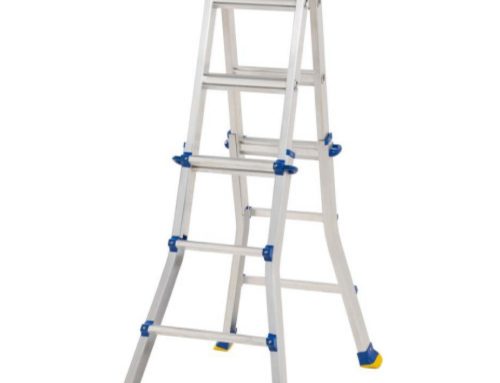Ladder accidents happen every day, some are serious but sometimes people are lucky, getting away with just a bit of bruising. When these accidents happen at home it is often the result of poor ladder choice, inexperience or laziness – leading to over-reaching or carrying too much weight up the ladder. When these accidents happen in the workplace, especially in a job where ladders are used routinely, it is a matter for the Health and Safety Executive to investigate. The HSE ensures safety in the workplace and if they know there has been a serious accident they will look into it, often prosecuting and fining employers for negligence when it can be proved that they did not take the right steps to ensure the safety of their employees in the workplace.
getting away with just a bit of bruising. When these accidents happen at home it is often the result of poor ladder choice, inexperience or laziness – leading to over-reaching or carrying too much weight up the ladder. When these accidents happen in the workplace, especially in a job where ladders are used routinely, it is a matter for the Health and Safety Executive to investigate. The HSE ensures safety in the workplace and if they know there has been a serious accident they will look into it, often prosecuting and fining employers for negligence when it can be proved that they did not take the right steps to ensure the safety of their employees in the workplace.
In the case of Eugene Campbell, in Northern Ireland, the HSE could do no more than investigate the self-employed chimney sweep, who unfortunately died after falling from the roof of a house he had been working at, in 2015. It is believed that Mr Campbell did not use the roof ladder he had with him in order to access the chimney at the top, but instead used a ladder at the side of the house to reach the ridge, which he then used to get to the chimney. While he was walking along the roof he lost his footing and fell, breaking both arms, his jaw and skull. He was found after the homeowners realised there had been no noise from the chimney for an hour, and ongoing outside they saw Mr Campbell lying on the floor. He was pronounced dead at the scene.
It is a mystery why Mr Campbell, 57, did not use his roof ladder despite having it with him. As a well-respected tradesman and someone with many years of experience in his trade, it is astounding to think he would have taken such a risk with his life unnecessarily. Perhaps complacency got the better of him and he thought he knew best, but it proves that experience is no substitute for thoughtfulness when it comes to safety at work.
Lee and Jonathan Muir, a father and son team of builders based in Exmouth, have been fined £8,600 after a teenage apprentice fell from a ladder and broke his back. Kieron Saxton, who was 18-year-old, was the first employee of their company and despite seven months accident free employment, he fell from an unfooted ladder after over-reaching while he was painting the exterior of a house. The Muirs had believed him to be trained in ladder safety as part of his college course, but Mr Saxton had not yet received any formal training at college. Had this occurred, he would have known about the dangers of over-reaching. Fortunately, Mr Saxton only fractured two vertebrae and was able to return to work three months after the accident, having been left with no permanent injury. This was a case of miscommunication and complacency at play; as Mr Saxton may have thought he knew what he was doing, and the Muirs were under the impression he had been correctly trained in ladder use. Following the incident, the Muirs have stopped using ladders on their jobs and only use scaffolding, which is much safer than ladders. They complied fully with the investigation and everyone concerned has clearly learnt their lesson.
Volvo received a hefty £90,000 fine after a fall by an employee off a step ladder at work and ended up in a coma. The man had been servicing a large truck when he fell, hitting his head and losing consciousness. This resulted in him being induced medically into a coma for two weeks. He continues to suffer from the effects of his injuries and has not been able to return to work since the incident in 2015. The HSE investigation found that the step ladder used was not fit for purpose, having worn anti-slip feet and other damage. It had also not been recently checked and therefore should not have been in use. In addition to the poor equipment, no employees at Volvo had been trained in working at height or in the inspection and maintenance of such equipment.
Although this was a small fall compared to some, the consequences were devastating for the injured man and his family, who were unsure whether he would survive the brain injuries he sustained in the accident. When accidents happen in the workplace the HSE is in place to investigate and obtain compensation for injured parties, as well as provide training and guidance for those working with ladders and access equipment. At home, there is no-one else to blame, nevertheless ladder safety should be taken just as seriously, if not more so, than in the workplace.






Leave A Comment
You must be logged in to post a comment.